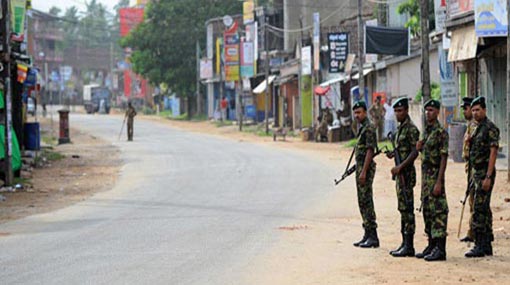
File photograph
Sri Lanka’s militarised response to the coronavirus pandemic “poses grave threats to human rights,” the Adayaalam Center for Policy Research (ACPR) said in their latest brief.
ACPR highlighted four areas of human rights concerns in Sri Lanka’s militarised response to the COVID-19 pandemic; the lack of a legal basis for the curfews; the militarisation of what should be a public health response; the suppression of freedom of expression and the increase in intercommunal tensions related to Covid-19.
“ACPR is deeply concerned that the Government of Sri Lanka’s (GoSL) response to the pandemic has continuously disregarded human rights and presents worrying implications for already marginalised communities, particularly Muslims and Tamils,” the brief said.
The ACPR are calling on “international actors who are providing Covid-19 related assistance to Sri Lanka to insist on the GoSL adopting a human rights approach that is de-militarised and in line with international human rights law.”
Key Areas of Human Rights Concerns
The legality (or lack thereof) of the curfew
“The laws of Sri Lanka do not provide for a ‘police curfew’. No curfew has been declared under the Public Security Ordinance, neither has a ‘state of disaster’ been declared under the Disaster Management Act,” the brief said.
“The GoSL has likely been reluctant to declare a curfew under the PSO because to declare a curfew longer than a month it needs Parliament’s approval. This is currently impossible unless the President’s decision to dissolve the Parliament is reversed and the Parliament is reconvened. The President has repeatedly stated that he will not call back the dissolved Parliament,” the ACPR added.
Militarisation of the Covid-19 Response
While public health officials are leading the Covid-19 response in other countries, “the military is squarely in charge of all aspects of the response.” Lt. General Shavendra Silva, a credibly accused war criminal, is leading Sri Lanka’s heavily militarised response. "The militarisation of civilian authorities is not new in Sri Lanka, and its continuation in the State’s response to Covid-19 is unsurprising but deeply concerning," said the think tank.
The ACPR’s brief focuses on the militarisation of civilian authorities “that form an integral part of the response effort”, military-run quarantine centres in the North-East “despite the lack of infections in those areas at the time was due to systemic discrimination” and military controlled curfew passes.
The Sri Lankan military has also deployed the use of drones, military intelligence "and the assistance of telecommunication companies to trace individuals" suspected of coming into contact with the coronavirus,
"In a context where the military has consistently used surveillance as a tool of intimidation and harassment of human rights defenders, journalists, and the Tamil community, the broad powers and technology being given to them without any apparent oversight or end date is of grave concern to ACPR," the brief stated.
Suppression of Dissent
ACPR also expressed concerns over Sri Lanka’s suppression of freedom of expression during the pandemic:
“In Sri Lanka, on April 1, 2020, the Acting Inspector General (IGP) instructed the police to take legal action against those who publish posts on social media criticising government officials and obstructing their duties.”
“As of April 17, the police had reportedly arrested 17 individuals ‘for spreading false information’ about Covid-19.”
Covid-19 and Intercommunal Tensions
“In the South, Sinhala-Buddhist nationalist groups supported by certain media outlets and powerful members of the GoSL have pedalled fake news pointing to the Muslim community as the drivers of the virus. This comes in the wake of almost a decade of increasing racist rhetoric, economic reprisals and violence against the Muslim community driven largely by extremist Sinhala-Buddhist nationalist groups.”
The ACPR also highlighted the ostracisation of the Christian community following “some social media proliferation of anti-Christian rhetoric through sensationalist reporting of the virus being traced to an Evangelical Pastor.”
“While the rhetoric in no way reached the levels that anti-Muslim rhetoric has achieved, it is still an issue to be watched amidst growing extremist Hindu fundamentalist elements in the North which have attempted to marginalise and alienate Christian communities.”
ACPR went on to call on international actors "who are providing COVID-19 related assistance to Sri Lanka to insist on the GoSL adopting a human rights approach that is de-militarised and in line with international human rights law".
The brief comes after the US, EU and Canadian governments all pledged grants towards assisting Sri Lanka's coronavirus response.
Read the full text of the brief here.
We need your support
Sri Lanka is one of the most dangerous places in the world to be a journalist. Tamil journalists are particularly at threat, with at least 41 media workers known to have been killed by the Sri Lankan state or its paramilitaries during and after the armed conflict.
Despite the risks, our team on the ground remain committed to providing detailed and accurate reporting of developments in the Tamil homeland, across the island and around the world, as well as providing expert analysis and insight from the Tamil point of view
We need your support in keeping our journalism going. Support our work today.
For more ways to donate visit https://donate.tamilguardian.com.

